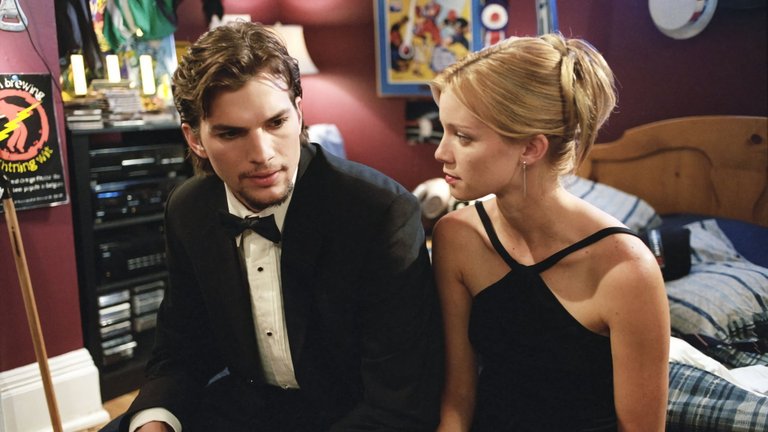Film Review: The Butterfly Effect (2004)

One of the most annoying things about modern Hollywood is its apparent inability to properly use intriguing or promising ideas. It is even sadder when it happens with films that show not only great promise but signs that someone has actually put some sort of creative effort into them. One such example can be found in The Butterfly Effect, a 2004 science fiction drama written and directed by Eric Bress and J. Mackye Gruber.
The title refers to a concept associated with chaos theory, based on the idea that seemingly insignificant or inconsequential events, like a single butterfly flapping its wings in China, can have profound consequences, such as causing a tornado in another part of the world. This concept is something that Evan Treborn (played by Ashton Kutcher), a 21-year-old college student and the protagonist, would encounter when subjected to a strange phenomenon related to his mysterious condition that has plagued him since he was seven years old and growing up in upstate New York. The symptoms were mostly in the form of blackouts, which were later revealed to be the results of various traumatic events he had witnessed with his childhood friends Lenny Kagan (played by Elden Henson), Kayleigh Miller (played by Amy Smart), and Kayleigh’s brother Tommy (played by William Lee Scott). Doctors failed to find a physical cause for Evan’s condition, but they instead encouraged him to keep a diary. Seven years passed without blackouts, but Evan, who is a psychology major, has dedicated much of his time to studying the phenomena. While rereading his journals, he discovers the ability not only to relive his past but actually to travel in time and, armed with prior knowledge, change his past. His interventions, however, almost always have unintended consequences, resulting in crippling injuries, lifelong traumas, incarcerations, or death among his friends. In order to correct those mistakes, partly motivated by the love he feels for Kayleigh, Evan keeps returning and trying to set things right.
Eric Bress and J. Mackye Gruber, until this film best known as the scriptwriters for Final Destination 2, didn’t have an idea that could be described as the most original. Many would call it some sort of variation of Groundhog Day or Sliding Doors, but it can also be viewed as an expression of the almost universal desire of every human to alter the past or at least ponder whether his or her life would have been better or worse if some of the choices had been made differently. Bress and Gruber don’t bother with any kind of scientific or parascientific explanation for the phenomenon, but the concept is handled in a reasonably convincing manner. The budget limitations, on the other hand, also limit the scope of Evan’s interventions, with newly created parallel universes resembling each other too closely and Lenny, Kayleigh, and Tommy, among other things, finding ways to attend Evan’s college. On the other hand, Bress and Gruber try to compensate for this with increased melodrama, subjecting Evan and his friends to childhood and adolescent traumas that involve sexual abuse, parents in mental institutions, pets being burned alive, or witnessing innocent people blown to bits in a prank gone tragically wrong. This results in the film being generally dark and at times exploitative, especially in scenes that feature violence and some nudity. Apparently unable to find a proper way to end it, Bress and Gruber decide to have Evan make a final sacrifice that would bring some sort of bittersweet closure, likely leaving most viewers unsatisfied.
A more obvious problem with The Butterfly Effect is the casting of Ashton Kutcher as the protagonist. The actor, who was at the time best known as the iconic and popular star of television comedies and who would later earn extra fame as briefly being the most followed person on Twitter, valiantly tries to prove himself as a serious dramatic actor, but this effort generally fails. This is partly due to comparisons with other members of the cast who deliver a much better performance, especially Elden Henson (later best known as Foggy Nelson in the Netflix version of Daredevil) and the charming Amy Smart, who play multiple versions of the same character. Even young Logan Lerman as the younger Evan makes a better impression than Kutcher, and the same can be said about Eric Stoltz as creepy Mr. Miller and Melora Walters as Evan’s long-suffering mother.
Critics didn’t like The Butterfly Effect, but it did little to impact the audience that flocked to theatres, partly due to Kutcher’s popularity. This success isn’t exactly undeserved because, despite some conceptual flaws, the film is solid and entertaining, at least for fans of the genre. The success is also reflected in two generally inferior sequels - Butterfly Effect 2, released in 2006, and Butterfly Effect 3: Revelations, released in 2009.
RATING: 5/10 (++)
Blog in Croatian https://draxblog.com
Blog in English https://draxreview.wordpress.com/
InLeo blog https://inleo.io/@drax.leo
InLeo: https://inleo.io/signup?referral=drax.leo
Unstoppable Domains: https://unstoppabledomains.com/?ref=3fc23fc42c1b417
Hiveonboard: https://hiveonboard.com?ref=drax y
Bitcoin Lightning HIVE donations: https://v4v.app/v1/lnurlp/qrcode/drax
Rising Star game: https://www.risingstargame.com?referrer=drax
1Inch: https://1inch.exchange/#/r/0x83823d8CCB74F828148258BB4457642124b1328e
BTC donations: 1EWxiMiP6iiG9rger3NuUSd6HByaxQWafG
ETH donations: 0xB305F144323b99e6f8b1d66f5D7DE78B498C32A7
Posted using CineTV

Yay! 🤗
Your content has been boosted with Ecency Points, by @drax.
Use Ecency daily to boost your growth on platform!